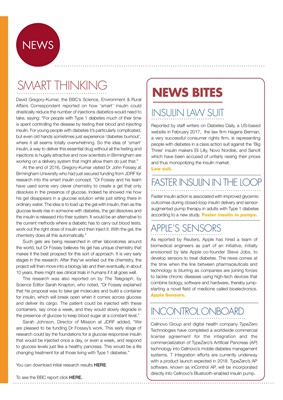
NEWS
SMART THINKING
David Gregory-Kumar, the BBC's Science, Environment & Rural
Affairs Correspondent reported on how 'smart' insulin could
drastically reduce the number of injections diabetics would need to
take, saying: "For people with Type 1 diabetes much of their time
is spent controlling the disease by testing their blood and injecting
insulin. For young people with diabetes it's particularly complicated,
but even old hands sometimes just experience 'diabetes burnout',
where it all seems totally overwhelming. So the idea of 'smart'
insulin, a way to deliver this essential drug without all the testing
and injections is hugely attractive and now scientists in Birmingham
are starting work on a delivery system that might allow them do
just that."
At the end of 2016, Gregory-Kumar visited Dr John Fossey at
Birmingham University who had just secured funding from JDRF for
research into the smart insulin concept. "Dr Fossey and his team
have used some very clever chemistry to create a gel that only
dissolves in the presence of glucose. Indeed he showed me how
his gel disappears in a glucose solution while just sitting there in
ordinary water. The idea is to load up the gel with insulin, then as the
glucose levels rise in someone with diabetes, the gel dissolves and
the insulin is released into their system. It would be an alternative to
the current methods where a diabetic has to carry out blood tests,
work out the right dose of insulin and then inject it. With the gel, the
chemistry does all this automatically."
Such gels are being researched in other laboratories around
the world, but Dr Fossey believes his gel has unique chemistry that
makes it the best prospect for this sort of approach. It is very early
stages in the research. After they've worked out the chemistry, the
project will then move into a biology lab and then eventually, in
about 10 years, there might see clinical trials in humans if it all goes
well. You can download initial research results HERE.
The research was also reported on by The Telegraph, by
Science Editor Sarah Knapton, who noted, "Dr Fossey explained
that his proposal was to take gel molecules and build a container
for insulin, which will break open when it comes across glucose
and deliver its cargo. The patient could be injected with these
containers, say once a week, and they would slowly degrade in
the presence of glucose to keep blood sugar at a constant level."
Sarah Johnson, Director of Mission at JDRF added, "We
are pleased to be funding Dr Fossey's work. This early stage of
research could lay the foundations for a glucose responsive insulin
that would be injected once a day, or even a week, and respond
to glucose levels just like a healthy pancreas. This would be a life
changing treatment for all those living with Type 1 diabetes."
To see the BBC report click HERE.
FASTER INSULIN
IN THE LOOP
Reported by staff writers on Diabetes Daily, a US-based
website in February 2017, the law firm Hagens Berman,
is a very successful consumer rights firm, is representing
people living with diabetes in a class action suit against
the 'Big Three' insulin makers Eli Lilly, Novo Nordisk, and
Sanofi which have been accused of unfairly raising their
prices and thus monopolizing the insulin market by the
plaintiffs in the case: people with Type 1 diabetes.
Law suit.
INSULIN LAW SUIT
Faster insulin action is associated with improved glycemic
outcomes during closed-loop insulin delivery and sensoraugmented pump therapy in adults with Type
1 diabetes
according to a new study. Faster insulin in pumps.
APPLE'S SENSORS
As reported by Reuters, Apple has hired a team of
biomedical engineers as part of an initiative, initially
envisioned by late Apple co-founder Steve Jobs, to
develop sensors to treat diabetes. The news comes at
the time when the line between pharmaceuticals and
technology is blurring as companies are joining forces
to tackle chronic diseases using high-tech devices that
combine biology, software and hardware, thereby jumpstarting a
novel field of medicine called bioelectronics.
Apple Sensors.
A BIG INTERVIEW
Cellnovo Group and digital health company TypeZero
Technologies have completed a worldwide commercial
license agreement for the integration and the
commercialization of TypeZero's Artificial Pancreas (AP)
technology into Cellnovo's mobile diabetes management
systems. T Integration efforts are currently underway
with a product launch expected in 2018. TypeZero's AP
software, known as inControl AP, will be incorporated
directly into Cellnovo's Bluetooth-enabled insulin pump.
NEWS BITES